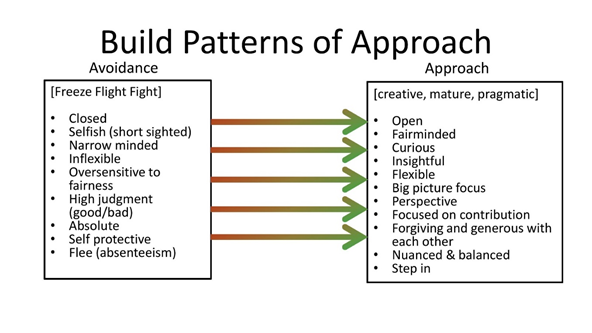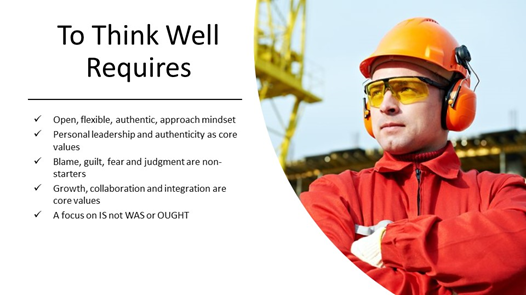It is probably safe to say that this period in the life of Moly-Cop Waratah is one of the most dynamic and challenging that most leaders in the business have experience in a while, if ever. Change is inevitable it can come slowly and at times very quickly. My role allows me to speak with a lot of different people at different levels. Some people are managing it better than others and it is no surprise, that the people who have the highest emotional intelligence and self-awareness are the most resilient. Either way, one of the most productive parts of the plant at the moment seems to be the Rumor Mill.
I know this is easy for me to say from my position in the grandstand, so I wrote the below to provide you with some ideas that might help. I hope it will adds value.
In High Performance Thinking we talk about the 'Moments that Matter", well this is a moment that matters. Leaders build and fix things, so what can you do to help each other operate safely and productively at this moment?
What can we expect from people?
Recall from our training, our minds are looking in each moment to make predictions that keep us safe. We can group 'safety' to our minds around the following neuro-biological needs or categories:
I know this is easy for me to say from my position in the grandstand, so I wrote the below to provide you with some ideas that might help. I hope it will adds value.
In High Performance Thinking we talk about the 'Moments that Matter", well this is a moment that matters. Leaders build and fix things, so what can you do to help each other operate safely and productively at this moment?
What can we expect from people?
Recall from our training, our minds are looking in each moment to make predictions that keep us safe. We can group 'safety' to our minds around the following neuro-biological needs or categories:
All of the above are being challenged for just about everyone.
You can see a video of me explaining this model by following this link.
When these needs are compromised people feel unsafe - insecure. Some part of you might be thinking - "Good, about time people began stepping up". However, this view is usually not helpful or productive. Fear is only productive in the very short term, and usually counter-productive in the medium and longer term. At moments like this we can predict the kinds of actions and behaviours that are likely to arise from this state. When our mind feels the above needs are being threatened, we try and recover them. We can get them back through strategies of approach or avoidance. The lists below illustrate how these different strategies tend to show up in behaviour.
- How much control and orientation do people have?
- How consistent is my world? My role?
- How consistently can I predict and navigate it?
- Do I have the skills to adapt?
- What will my job be?
- By how much are things going to change?
- Am I on the way up? Down? Out? When the music stops will I have a seat?
- What are the implications of that for my life/family/mortgage etc?
- My Motivation - (Avoiding Pain / Seek Pleasure - the proverbial carrot and stick)
- How can I minimise effort?
- What's in it for me?
- Why should I do that?
- How can I avoid getting into trouble?
- How can I gain ($$, status, little wins, big wins)?
- Is what I'm doing worth it?
- How tired am I? Can I keep going?
- Are gaps in my knowledge being exposed?
- Is my knowledge/experience being listened to or ignored?
- Attachment - Connection
- Am I 'in the group'?
- Who do I identify with?
- Who is on 'my team' (Moly-Cop? My work section? My trade colleagues? My crew? Just me?)
- How important or valued do I feel I am to the organisation? Does anyone care about or respect my contribution?
- Is my voice being heard?
You can see a video of me explaining this model by following this link.
When these needs are compromised people feel unsafe - insecure. Some part of you might be thinking - "Good, about time people began stepping up". However, this view is usually not helpful or productive. Fear is only productive in the very short term, and usually counter-productive in the medium and longer term. At moments like this we can predict the kinds of actions and behaviours that are likely to arise from this state. When our mind feels the above needs are being threatened, we try and recover them. We can get them back through strategies of approach or avoidance. The lists below illustrate how these different strategies tend to show up in behaviour.
How can we help?
As leaders, this is the time to LEAD. These are the moments where you need to help people find their way.
To do this in the context of the model above, the question could be "how do we help people get their neuro-biological needs met?" How do we help them improve their sense of control and orientation? How do we motivate people to perform well and for the right reasons? How do we build a sense of shared experience and team - rather than allowing silos and dis-integration?
For example, how can we improve a persons sense of control? Some possible strategies could include:
These are just a few you can try, however use your mind and your knowledge of your people and the situation and come-up with your own strategies. What can you do to support their mind state? I'd love to read about them through a HPT example.
In general to think well requires some of the following.
As leaders, this is the time to LEAD. These are the moments where you need to help people find their way.
To do this in the context of the model above, the question could be "how do we help people get their neuro-biological needs met?" How do we help them improve their sense of control and orientation? How do we motivate people to perform well and for the right reasons? How do we build a sense of shared experience and team - rather than allowing silos and dis-integration?
For example, how can we improve a persons sense of control? Some possible strategies could include:
- be clear about what is, and what isn't in our control
- Acknowledging the things I'm worried about that are not within my control gives me permission to let go of the worry about them and focus on what I can influence
- By narrowing the field to the things I can actually control, it allows me to exert energy and focus on actions. This feels better and improve my sense of control by doing something productive. Furthermore, it is the best chance I've got of influencing the things that seem out of my control. For example, my best chance of improving my job security is to do the job in front of me to the best of my ability. It might work, or it might not, but either way it is the most likely way to produce a good outcome.
- Provide people opportunities to own moments
- Ask them to come to you with positive ideas and/or solve problems (within their realm of knowledge)
- Ask them to collaborate with others - go and ask, go and share.
- Allow them, where possible to control their shift - tell them 'what' you need done, and allow them to work out 'how' (again, all caveats around safety, control and competing priorities apply)
- Be clear - as clear as you can
- when people are stressed it can be really difficult for them to come-up with ideas and manage their shift. They are so trapped by their thoughts, that they are unable to see the bigger picture or pathway. So in these moments, you may need to be overly prescriptive really clear about what you want them to do. Step it out for them, even if it is otherwise really obvious stuff, "Go there, get that and do this.... report back" with lots of clear, direct actionable language. I know this is in contradiction to the point above, but you've got to apply different strategies depending on the individual and their mind state at the time. There are times when you can allow them the room to work it out for themselves, there are times when they are so stuck you've got to help them directly.
These are just a few you can try, however use your mind and your knowledge of your people and the situation and come-up with your own strategies. What can you do to support their mind state? I'd love to read about them through a HPT example.
In general to think well requires some of the following.
Finally, look around and be as compassionate as you can. I know it is a tough, industrial work site and not a creche, but in moments like this our world shrinks, we reduce or constrict who is in "our in group", we communicate less and less effectively and we have a tendency to become increasingly isolated. The more individuals become isolated, the most whole culture dis-integrates and everything becomes more difficult. People are out to protect themselves, which in turn makes it easier to blame others and further deepen the divide.
To respond we need to be more inclusive than we feel. We need to be more generous towards each other than we feel, we need to assume good intent, be more open, listen more, park Blame/Guilt/Judgment. This doesn't mean lower our expectations for outcomes, it just means seeking high performance without the personal judgment and isolation that follows.
This is what grown-ups do, this is what emotionally intelligent leaders do. Don't let yourself be one of the kids.
Be the Lion, Not the deer.
To respond we need to be more inclusive than we feel. We need to be more generous towards each other than we feel, we need to assume good intent, be more open, listen more, park Blame/Guilt/Judgment. This doesn't mean lower our expectations for outcomes, it just means seeking high performance without the personal judgment and isolation that follows.
This is what grown-ups do, this is what emotionally intelligent leaders do. Don't let yourself be one of the kids.
Be the Lion, Not the deer.
Copyright 2019: Donovan Ataraxy Pty Limited. All rights reserved.



